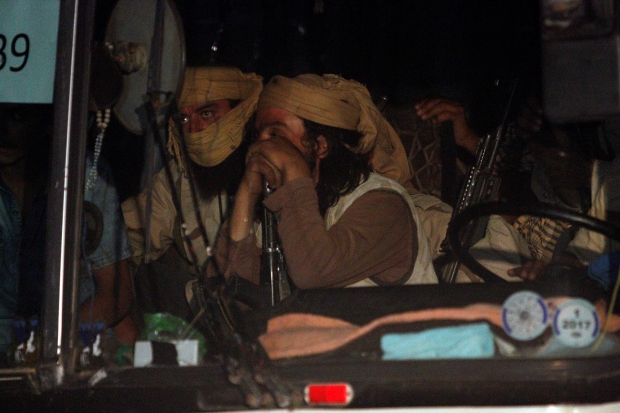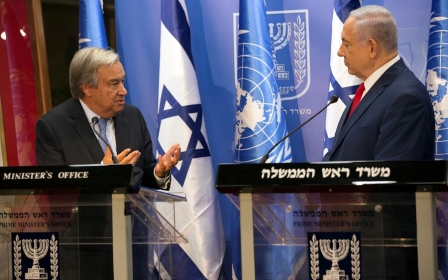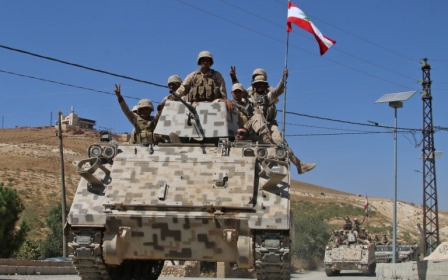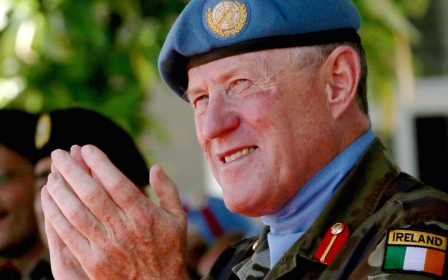Islamic State militants leave Syria-Lebanon border enclave
A convoy of Islamic State (IS) group militants and their families left the Lebanon-Syria border region on Monday under Syrian military escort, surrendering their enclave and travelling to eastern Syria after a week-long battle.
A line of ambulances and buses were shown on Syrian state television driving slowly through the arid countryside, the border's pale hills behind them, as they departed.
The transfer ends any militant presence on the border, an important goal for Lebanon and Hezbollah, and marks the first time IS has publicly agreed to a forced evacuation from territory it held in Syria.
IS agreed to a ceasefire deal that took effect on Sunday with the Lebanese army on one front and Hezbollah with the Syrian army on the other.
The militants had lost much of their mountainous enclave straddling the border since the two offensives began on opposite sides of the frontier.
The Lebanese army has said its offensive against IS did not involve coordination with the Syrian army or Hezbollah.
Lebanon's Hezbollah has been a close ally of Syrian President Bashar al-Assad throughout Syria's six-year war.
The leader of Hezbollah, Sayyed Hassan Nasrallah, said on Monday that the group had accepted IS's evacuation partly in order to find out the fate of nine Lebanese soldiers in the militants’ captivity since 2014.
The convoy being transferred into Syria included 308 militants with their small arms and 331 civilians, Nasrallah said in a televised speech.
Islamic State will hand over one Hezbollah captive and the bodies of some Hezbollah forces and one Iranian fighter killed in battles across Syria, he said.
At the last stage of the deal, the two sides would exchange the bodies for the convoy of militants at a transit point in Syria, Nasrallah said.
Eleven Hezbollah fighters and seven Syrian soldiers had been killed in their offensive in the western Qalamoun region on Syria's side of the border, he added.
The border battle has ended in "fully liberating Lebanese land and securing the border with Syria," he said.
Both Hezbollah and Lebanese officials have billed the evacuation as a surrender by Islamic State.
"We do not bargain. We are in the position of the victor and are imposing conditions," the head of Lebanon's internal security agency, General Abbas Ibrahim, said on Sunday.
The evacuees will travel across Syria under heavy security escort to IS lines near al-Bukamal in the eastern province of Deir Ezzor, a Lebanese security source said.
IS militants were earlier seen burning heavy equipment and arms which they left in the border enclave.
Northeast Lebanon saw one of the worst spillovers of the Syrian conflict in 2014, when IS and other militants briefly overran the border town of Arsal. The fate of nine Lebanese soldiers that Islamic State took captive in 2014 had remained unknown until Sunday.
Ibrahim, the Lebanese general, said the troops were almost certainly dead after recovering remains thought to belong to them.
The news and the evacuation deal have sparked some public outcry in Lebanon that authorities had not been able to retrieve the soldiers alive, while allowing the militants to leave safely.
Ibrahim said the Lebanese army was not seeking revenge or bloodshed, but had set out to “liberate” Lebanese soil from the militants and reveal the fate of the kidnapped soldiers.
Earlier this month, Nusra Front militants and a Syrian rebel group withdrew from their footholds along the border after accepting similar evacuation deals.
Those agreements came after a brief Hezbollah offensive that began at the end of July against militants of the ex-Nusra Front, which was al-Qaeda's affiliate in Syria until last year.
Hezbollah has maintained a strong presence in the parts of Syria near the border with Lebanon for years, helping Assad capture several rebel-held towns and villages there.
Inside Syria, Islamic State is retreating on many fronts, losing territory to separate offensives, including by the Russian-backed Syrian army and US-backed militias.
Middle East Eye propose une couverture et une analyse indépendantes et incomparables du Moyen-Orient, de l’Afrique du Nord et d’autres régions du monde. Pour en savoir plus sur la reprise de ce contenu et les frais qui s’appliquent, veuillez remplir ce formulaire [en anglais]. Pour en savoir plus sur MEE, cliquez ici [en anglais].





